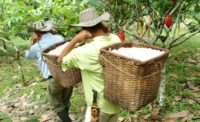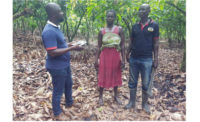Mars, Inc. plans to triple its global cocoa yield by developing more disease-resistant clones and continuing to improve farmer practices based on genetic knowledge of cocoa.
The global confectionery/pet food conglomerate has published research in the journal Frontiers of Plant Science that builds on work done by Mars, IBM and the USDA to help sequence the cocoa genome and make it publicly available.
The research also adds to work on higher-yielding pest- and disease-resistant clonal varieties Mars has helped develop with cocoa-growing countries. Applying this knowledge is expected to help farmers produce more cocoa on less land and with fewer pesticides, which can improve farmers’ livelihoods.
Specifically, Mars, Inc., in partnership with governmental and academic research organizations, used genetic markers to connect genetically-related cocoa trees and identify genes related to resistance of frosty pod, black pod and Ceratocystis wilt diseases.
In a keynote speech he delivered at the Fourth World Cocoa Conference in Berlin last month, Frank Mars, fourth-generation family member and member of the company’s board of directors, outlined Mars’ objectives in relation to this research.
“Over the next 10 years, Mars aims to develop even better disease-resistant clones,” Mars told conference attendees. “We’ll focus on both simple and advanced production methodologies and improved farmer practices with a goal to triple cocoa yields globally. This would free up land occupied with unproductive cocoa trees for farmers to grow other crops, including those for their own consumption. But to achieve this will require all of us in this room to think differently and work harder together; not only on better plant varieties and farming practices and models, but also on pest and disease control.”
Mars cited the need for continuing innovation, such as the company’s work through the Mars Center for Cocoa Science in Bahia, Brazil. Opened in 1982, the center has evolved to include private-public plant science partnerships with researchers and governments around the world. The center helps lead Mars’ efforts in areas such cocoa breeding, farming best practices, and pest and disease research and management.
Nonetheless, Mars said action the industry has taken so far hasn’t been sufficient to move the needle on sustainable cocoa.
“My hope is that 10 years from now, I can reflect on our efforts, both individually, and collaboratively,” Mars said. “I hope that I can look in the mirror and say I am proud of what we have achieved together. And know that cocoa does in fact have a sustainable future. And it’s one that uses science and technology to put farmers first.”





